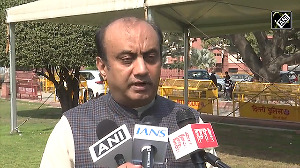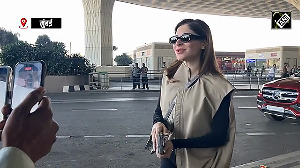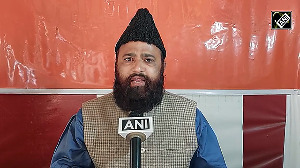China is the flavour of the month in Delhi, despite a stream of other foreign dignitaries visiting the Indian capital.
As part of the hectic preparations underway for the highly significant four-day visit of Chinese President Hu Jintao to India starting from November 20, Delhi is witnessing several seminars and brain-storming sessions involving the capital's strategic community, academics and China specialists over the significance of Hu's visit to India.
President Hu will be in India till November 23 and he will visit New Delhi, Agra and Mumbai. It is the first visit by a Chinese President in more than a decade.
With 2006 being celebrated as 'India-China friendship year', the Chinese Embassy in Delhi has used the occasion to attract impressive coverage for China in the Indian media as a modern power rising phenomenally on the world stage yet rooted in an ancient and great civilisation. The Chinese cultural events have provided the appropriate atmospherics for Hu's visit.
However, Hu's visit will not be solely a public relations extravaganza and there will be a lot serious business on the agenda as well.
An interesting pointer was Tuesday's announcement by Minister of External Affairs Pranab Mukherjee that India's Foreign Direct Investment policy will not be country specific. It hasn't gone unnoticed that Mukherjee was primarily reacting to a recent proposal by the National Security Council to the government that reportedly called for keeping China, Pakistan and North Korea in the 'FDI watch list' for security reasons.
Much dust was already stirred up in the recent weeks on the issue of the delay in the government according formal security clearance to two Chinese companies, Kaidi Electric Power Company and China Harbour Engineering Company, which form part of a consortium led by the Mumbai-based Zoom Developers that has won the international tender for the Rs 4,360 crore port project in Vizhinjam in Kerala.
The timing of Mukherjee's statement is vested with considerable significance as it is a pointer to the high importance attached to Hu's visit by the United Progressive Alliance government and its Left allies.
Chinese embassy officials told rediff.com that while the official announcement of Hu's visit has been made his final programme will only be known just a few days before his arrival.
Hu's visit to India follows the Chinese President Jiang Jemin's path-breaking visit ten years ago. Between the two visits, public perception in India regarding China has undergone a huge transformation. China's fantastic economic strides which have catapulted it to forefront of the world economy have impressed Indian minds. While this provides a role model for India, it also raises apprehensions of growing competition from China.
Looking at it from any conceivable angle, the widespread perception is that China is bound to loom large in the Indian calculus for decades to come. Indians, who believe in the country's abilities, are itching to take up the 'Chinese competition'. Bilateral trade between the two countries is expected to touch $20 billion (about Rs 90,000 crore) this year.
"With trade growing, we are in a better position to talk. Top level dialogue between leaders of both countries is significant in giving a push to relations," says Alka Acharya, member, National Security Advisory Board, and chairperson of Centre of East Asian Studies at the Jawaharlal Nehru University.
C V Rangnathan, former Indian ambassador to China, told rediff.com, "Hu Jintao is at the top of the hierarchy in China. As regards bilateral relations, there are high expectations on both sides and both leaders (Hu and Prime Minister Dr Manmohan Singh) are meeting at a time when the international scene is changing. Both are expected to exchange views how the world should be moving in tandem with the changing realities, and their perception in maintaining peace."
Dr Singh and Hu are well-known to each other. They have met and held talks five times during the last two years. Both have repeatedly affirmed their belief and commitment in charting out a mutually beneficiary agenda for the expansion of India-China relations.
Hu is the only member out of eight of the China's most powerful Standing Committee of Politburo who got re-elected. He remains the 'first amongst equals' in the Chinese political set up. From India's perspective, Hu is well-versed with India at a personal level too, having served as the Chinese Communist Party secretary in Lhasa, Tibet.
India-China relations have changed for the better in many respects since Chinese Premier Wen Jiabao visited India in May 2005.
India is aware that US, Japan and Taiwan figure at the top of China's strategic agenda at this point of time, but India's economic growth particularly in the services sector and its importance in maintaining stability in East Asia is a matter of interest.
To be sure, in May 2005, China's state-controlled media reiterated Beijing's claim to Arunachal Pradesh and Aksai Chin, but in general, China has maintained its traditional stance of patience and restraint on the vexed border dispute with India. China has been pursuing a consistent policy toward all its neighbours, including with countries such as Japan with which too it has intractable border problems, of creating a peaceful environment within which it becomes possible for China to pursue its national goals of development.
During the visit by then Prime Minister A B Vajpayee to China in June 2003, the mechanism of Special Representatives was established "to explore from the political perspective of the overall bilateral relationship the framework of a boundary settlement." Since then eight rounds of talks have been held without any interruption. According to unconfirmed reports, some kind of "package settlement" is being planned before Hu's arrival. National Security Advisor M K Narayanan, India's Special Representative and his counterpart Deputy Foreign Minister Dai Bingguo are expected to meet in the coming days.
According to Srikanth Kondapalli, author of two volumes on China's defence capabilities and Associate Professor at the JNU, "Although there is no confirmation yet, it is believed that India and China have arrived at a tacit understanding to hold on to the current position which means that India may lose Aksai Chin and some four posts currently manned by the Indo-Tibetan Border Police in the 'middle sector' and China will not claim Arunachal Pradesh."
He adds, "However that will be violation of the November 1962 Parliament resolution where India has resolved to claim back 'every inch of land' from China."
Rangnathan says, "I am not sure if the news is correct. But on the issue of border settlement, adjustments are required by both sides."
Whether the territorial adjustments will require actual transfers of land or both countries will simply surrender a cartographic claim sustained all these years on paper will be watched closely.
So far, neither government has displayed any political activity toward 'selling' any proposed or possible agreement to its people. That also means that during Hu's visit a breakthrough in the border talks need not be expected.
The officials from both sides are satisfied that quite a few high-level bilateral visits have taken place in the recent past. The reopening of the Nathu La pass in July 2006 -- after a gap of 44 years -- has shored up Sino-India relations. Chinese Ambassador to India Sun Yuxi told the media that India and China are engaged in discussions to expand the list of items that can be traded through Nathu La. The two governments have been working to improve facilities for conducting trade through the pass.
"The visit takes place at a time when China has been successfully implementing a foreign policy oriented towards fulfillment of its 'three major tasks' for the current era -- modernisation, national reunification and safeguarding world peace," says D S Rajan, former director, Cabinet Secretariat.
"Peace on the periphery has thus come to occupy a prominent place in China's South Asia policy. China has especially viewed its strategic partnerships with both India and Pakistan as unprecedented in the sense that neither relationship is directed against any third party," adds Rajan.
So, what are the likely issues on the table at the summit level talks in New Delhi?
Rangnathan says, "Undoubtedly, multi-polarity and multilateralism will be discussed."
Both sides have claimed that multilateralism is not directed against United Sates but both countries have compelling reasons for exchanging their views on the subject.
Kondapalli says, "China is tying up with France, Germany, Iran and Russia to ensure that America's idea of a unipolar world doesn't become reality."
Hu's visit will give New Delhi an opportunity to put across India's need for energy and explain the importance of the Indo-US nuclear deal. China is an influential member of the 45-nation Nuclear Suppliers Group and all decisions in NSG are taken on consensus basis.
Needless to say, Beijing's backing for the nuclear deal is imperative. There is great interest on this score since China has not yet taken a stand on the issue.
China-Pakistan nuclear co-operation is another worrying factor for India and has been unhelpful in developing mutual trust between India and China.
It has been reported that China will sign an agreement in the coming days to help Pakistan set up new nuclear energy plants.
Rangnathan, however, points out that China is not a new player in the business and it has claimed that nuclear co-operation with Pakistan will be strictly in accordance with International Atomic Energy Agency norms.
"India may worry but it should closely monitor the deal," he advises.
In the opinion of many 'China experts' in the Indian capital, there have been interesting nuances to China's stance vis-à-vis Pakistan ever since terrorism struck the Xinjiang Autonomous Region.
On the strategic front, India and China have conducted two joint naval exercises, one in Shanghai and another in Kochi, but there are some unresolved hitches in joint military exercises and possible joint operations in the future because army and air force are unable to fix the location for the exercises, and there seems to be trust deficit on that front. India has held several successful joint operations with US.
According to sources, during Hu's visit there might be an announcement on joint exercises.
Neither sides want any exercise to be held on the disputed land. China doesn't want exercises in Rajasthan because of Pakistani sensitivities. Last month, China's Air Force commander Qiao Qingzhen was in India for discussions with his Indian counterpart Air Chief O P Tyagi.
They seem to have discussed plans for holding joint exercise aimed at learning the 'flight safety' of the MiG series aircraft.
The past two naval exercises were mainly in the nature of search and rescue operations to protect vessels of both countries.
In this regard, Mukherjee's recent China visit in his capacity as the defence minister took the issue forward. He signed with his Chinese counterpart, General Cao Gangchuan an agreement to promote defence and military exchanges as well as hold joint military exchanges.
Mukherjee was given a warm welcome and provided with access to the People's Liberation Army facilities in the sensitive regions including in the border areas.
Hu and Singh will also discuss many roadblocks in bilateral trade relations. India's main complaint is that China mainly concentrates on importing iron ore and other raw materials from India, almost 60 per cent of its imports is raw materials.
China's import basket is not helping Indian manufacturing. India is looking for a 'win-win' situation. China on its part wants a Free Trade Agreement and an overall liberalisation of the India visa regime for its businessmen. As of now only 3.2 lakh visas are issued annually.
During the summit, it is expected that around 12 agreements will be signed, which will aim at the enhancement of bilateral relations in sports, health, education and environment.
China is pouring money into building roads along its borders with India. China is evidently seeking more border trade and the opening of many more customs posts. Bilateral trade is presently conducted through the shipping channel.
A Chinese official jokingly wondered whether the delegates accompanying Hu would have another 'complaint' besides the infrastructural constraints coming in the way of accelerating the bilateral economic cooperation, since they might find 'Indian-Chinese' far too spicy. The noodles served in India too are not what Chinese people are used too and, of course, beef items do not figure on the menus of most Indian restaurants.







 © 2025
© 2025